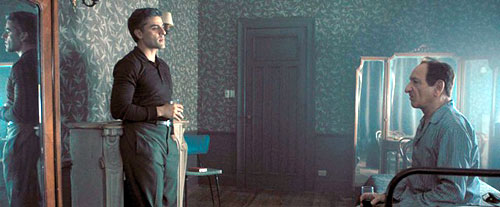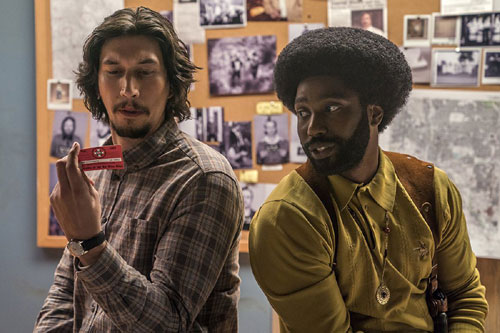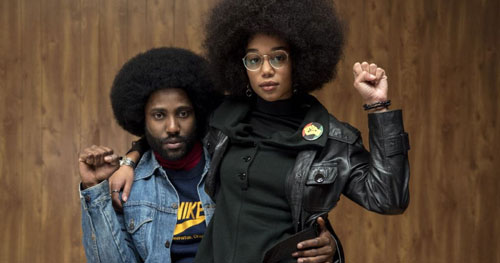|
Adolf Eichmann, the man who single-handedly demonstrated Hannah Arendt’s principle of the banality of evil, has become a movie star in death. There are at least a half-dozen feature films about Eichmann’s capture and trial; this doesn’t count documentaries or the two films—Die Wannsee-Konferenz and its English-language remake Conspiracy—in which we see Eichmann, his boss Reinhard Heydrich, and other Nazi henchmen sitting down to plan the Final Solution.
Actors such as Robert Duvall and Stanley Tucci have played Eichmann, and Operation Finale, Chris Weitz’s new film, adds a distinguished name to the list—Ben Kingsley, as least as far from his Gandhi mode as he was in Sexy Beast. Kingsley gives a performance that creeps under your skin; unfortunately, most of the rest of the movie stays dully above the surface.

The protagonist of Operation Finale is Peter Malkin (Oscar Isaac, also one of the film’s producers), a Mossad agent who eventually became chief of operations. However, at the beginning of Operation Finale, Malkin’s career in the Mossad is in jeopardy. His fellow agents consider him a loose cannon, and a botched mission he directed, in which the wrong man was captured and killed, has not helped his reputation.
So when Sylvia Hermann (Haley Lu Richardson), a German Jewish girl in Argentina, reports she briefly dated a boy who turned out to be Eichmann’s son. Malkin’s fellow agents aren’t eager to have Malkin along for the capture mission. But Mossad Director Isser Harel (Lior Raz) picks Malkin anyway; he’s the only one with the relevant expertise for an operation such as this.
The rest of the movie is familiar from other Eichmann movies—the stakeout of the house on Garibaldi Street, actually a rural dirt lane, and the many perils the agents face in spiriting Eichmann out of Argentina. Some commentators have noted that Operation Finale departs substantially in several ways from the historical record, especially regarding the details of Sylvia Hermann’s role in the story. Also, one of the agents, a man in real life, is a woman in the movie (played by Melanie Laurent) to give Peter a love interest.
However, the main problem with Operation Finale is that it is more dutiful than exciting.
Far too much of the movie seems to be by rote, even the flashback scenes in which we see Eichmann committing his atrocities.
There are some good supporting performances, especially by Michael Aronov and Nick Kroll as two of Malkin’s fellow agents. But Operation Finale only really comes to life in the scenes between Kingsley and Isaac. To protect the agents and the Israeli government, Eichmann must sign a confession of his crimes, which would transform the operation from a kidnapping to a legal extradition. Malkin takes it on himself to persuade Eichmann to sign. This leads to moments of riveting dramatic tension between two consummately accomplished actors. Eichmann, the reptilian mass murderer, enjoys and exploits the opportunity the situation gives him to bait Malkin, a man seething with rage over the personal tragedies he suffered in the Holocaust.
Operation Finale ends with archival footage of Eichmann’s trial. It is fitting that the man who said he would leap into his grave singing has no grave at all.
For a far more scintillating, incendiary film about hunting racist monsters, we need only walk across the multiplex lobby to where Spike Lee’s BlacKkKlansman is playing. Based on the memoirs of retired Colorado Springs police officer Ron Stallworth, BlacKkKlansman tells an amazing story that could not possibly be more relevant to our own times.
Never one to miss a chance to drive a point home, Lee begins BlacKkKlansman with the making of a white supremacist instructional film by the fictional (and abysmally stupid) Dr. Kennebrew Beauregard, played with relish by Alec Baldwin. Hilarious and unnerving in equal degree, this sequence sets the tone for what is to follow.
The movie proper begins with Stallworth (John David Washington) joining the Colorado Springs Police Department in 1979, the first African-American to do so. Stallworth is eager to get out in the field, but is instead assigned to the records room, where he is forced to deal with the blatant racism of officers such as Andy Landers (Frederick Weller), who has a well-earned reputation for shooting black male suspects and sexually assaulting black female ones.

Urging his boss, Chief Bridges (Robert John Burke), to give him a chance to do some real police work, Stallworth is assigned to go undercover to a speech at Colorado College by Kwame Ture (Corey Hawkins). The police regard Ture—formerly known as Stokely Carmichael—as a dangerous radical. Stallworth, to this point apolitical, accepts the assignment, and finds himself stirred to the depths of his being by Ture’s message of empowerment. He is also stirred, in different ways, by Patrice Dumas (Laura Harrier), president of the Black Student Union at the college. But Patrice is contemptuous of the police, and Stallworth dares not tell her he is a cop.

Soon afterward, Stallworth is assigned to the intelligence division. Leafing through the paper at his desk one day, he finds an ad with a phone number, soliciting recruits for the Ku Klux Klan. On a very serious whim, he calls the number and reaches Walter Breachway (Ryan Eggold), head of the local KKK chapter. Within a minute, Walter is convinced he’s found another fine, upstanding Aryan recruit.
From this point, BlacKkKlansman becomes the story of Stallworth’s infiltration-by-proxy of the nation’s premier white supremacist organization. Obviously Stallworth can’t show up in person for his initiation, so he sends in his place his partner Flip Zimmerman (Adam Driver). Like Stallworth at the beginning, Flip is somewhat disengaged from his own heritage—a secular Jew who never gave his religion or ethnicity a second thought. It is Stallworth who persuades him that the Klan is also his enemy—who asks him, in effect, whose side are you on?
The undercover operation puts Flip in a series of perilous situations. Walter Breachway and most of his fellow Klansmen take Flip at his word that he is Ron Stallworth, but a fanatic named Felix Kendrickson (Jasper Paakkonen), smarter and more dangerous than the others, guesses early on that Flip/Stallworth isn’t who he says he is. In one particularly unnerving sequence, Felix gives Flip a “Jew quiz” that ends with Felix’s demand that Flip drop his pants. It is up to Stallworth—who, as always, has Flip’s back—to get Flip out of this jam, in the simplest, most direct way possible.
BlackKkKlansman builds to an exciting climax as Stallworth and Flip uncover a bomb plot that directly endangers Patrice. However, Lee has lots of fun along the way with the sheer stupidity of people such as Grand Imperial Wizard David Duke (Topher Grace). One of the funniest sequences in BlacKkKlansman is Duke, in one of several telephone conversations with the real Stallworth, explaining how he can always tell a black speaker from a white one over the phone. Stallworth turns this on Duke, hilariously, at film’s end.
As typical of a Spike Lee joint, BlacKkKlansman is superbly acted throughout. Washington, son of Denzel, has a lot of his father’s grace and charisma, as well as an excellent ability to portray moral quandaries on screen. Adam Driver shares this ability, and this (among other things) makes Washington and Driver a great team.
Like Do the Right Thing and Jungle Fever, BlacKkKlansman is as much a debate between the characters, and by extension the audience, as anything else. Even at film’s end Patrice—knowing that Stallworth is a policeman, and knowing he saved her life—still finds it unacceptable that any black person could be a member of a pervasively racist police system, and she and Stallworth are still hashing this out. But then something happens that makes it plain Patrice and Stallworth are equally militant warriors in the fight for equality and justice.
Lee ends BlacKkKlansman with footage of the murderous Charlottesville riots and the real David Duke giving his blessing to the carnage. The film’s final image is of the American flag, in black and white, upside down. The message could not be plainer: the time for action is now. Whose side are you on?
|